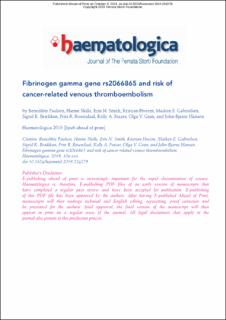| dc.contributor.author | Paulsen, Benedikte | |
| dc.contributor.author | Skille, Hanne | |
| dc.contributor.author | Smith, Erin N. | |
| dc.contributor.author | Hveem, Kristian | |
| dc.contributor.author | Gabrielsen, Maiken Elvestad | |
| dc.contributor.author | Brækkan, Sigrid Kufaas | |
| dc.contributor.author | Rosendaal, Frits Richard | |
| dc.contributor.author | Frazer, Kelly A. | |
| dc.contributor.author | Gran, Olga Vikhammer | |
| dc.contributor.author | Hansen, John-Bjarne | |
| dc.date.accessioned | 2020-08-25T07:40:43Z | |
| dc.date.available | 2020-08-25T07:40:43Z | |
| dc.date.created | 2020-01-15T10:44:40Z | |
| dc.date.issued | 2019 | |
| dc.identifier.issn | 0390-6078 | |
| dc.identifier.uri | https://hdl.handle.net/11250/2673776 | |
| dc.description.abstract | Venous thromboembolism (VTE) is a frequent complication in patients with cancer. Homozygous carriers of the fibrinogen gamma gene (FGG) rs2066865 have a moderately increased risk of VTE, but the effect of the FGG variant in cancer is unknown. We aimed to investigate the effect of the FGG variant and active cancer on the risk of VTE. Cases with incident VTE (n=640) and a randomly selected age-weighted sub-cohort (n=3,734) were derived from a population-based cohort (the Tromsø study). Cox-regression was used to estimate hazard ratios (HR) with 95% confidence intervals (CI) for VTE according to categories of cancer and FGG. In those without cancer, homozygosity at the FGG variant was associated with a 70% (HR 1.7, 95% CI: 1.2–2.3) increased risk of VTE compared to non-carriers. Cancer patients homozygous for the FGG variant had a two-fold (HR 2.0, 95% CI: 1.1–3.6) higher risk of VTE than cancer patients without the variant. Moreover, the six-months cumulative incidence of VTE among cancer patients was 6.4% (95% CI: 3.5–11.6) in homozygous carriers of FGG and 3.1% (95% CI: 2.3–4.7) in those without risk alleles. A synergistic effect was observed between rs2066865 and active cancer on the risk of VTE (synergy index: 1.81, 95% CI: 1.02–3.21, attributable proportion: 0.43, 95% CI: 0.11–0.74). In conclusion, homozygosity at the FGG variant and active cancer yielded a synergistic effect on the risk of VTE. | en_US |
| dc.language.iso | eng | en_US |
| dc.publisher | Ferrata Storti Foundation | en_US |
| dc.rights | Navngivelse-Ikkekommersiell 4.0 Internasjonal | * |
| dc.rights.uri | http://creativecommons.org/licenses/by-nc/4.0/deed.no | * |
| dc.title | Fibrinogen gamma gene rs2066865 and risk of cancer-related venous thromboembolism | en_US |
| dc.type | Peer reviewed | en_US |
| dc.type | Journal article | en_US |
| dc.description.version | publishedVersion | en_US |
| dc.source.journal | Haematologica | en_US |
| dc.identifier.doi | 10.3324/haematol.2019.224279 | |
| dc.identifier.cristin | 1773448 | |
| dc.description.localcode | Copyright© 2020 Ferrata Storti Foundation Material published in Haematologica is covered by copyright. All rights are reserved to the Ferrata Storti Foundation. Use of published material is allowed under the following terms and conditions: https://creativecommons.org/licenses/by-nc/4.0/legalcode. Copies of published material are allowed for personal or internal use. Sharing published material for non-commercial purposes is subject to the following conditions: https://creativecommons.org/licenses/by-nc/4.0/legalcode, sect. 3. Reproducing and sharing published material for commercial purposes is not allowed without permission in writing from the publisher. | en_US |
| cristin.unitcode | 194,65,20,15 | |
| cristin.unitname | Helseundersøkelsen i Nord-Trøndelag | |
| cristin.ispublished | true | |
| cristin.fulltext | original | |
| cristin.qualitycode | 1 | |

